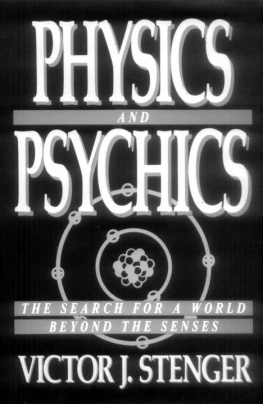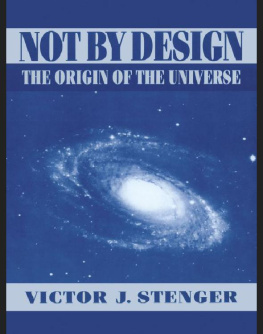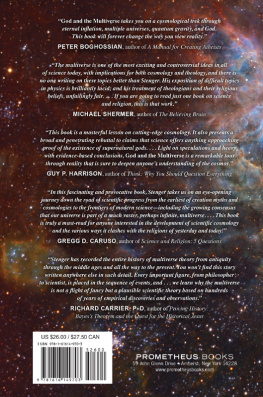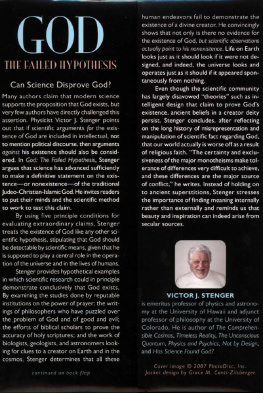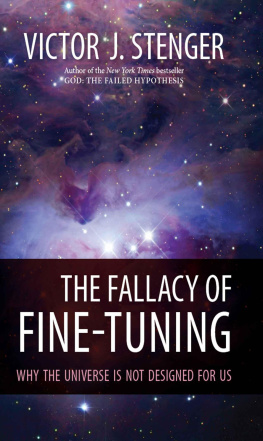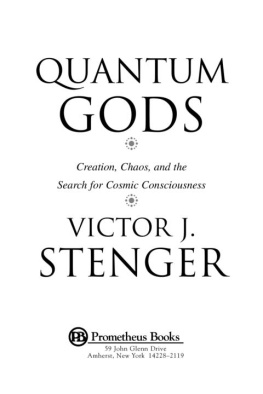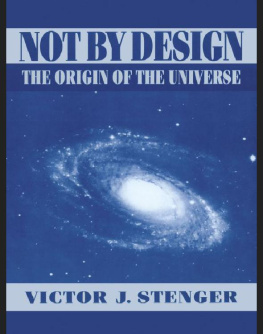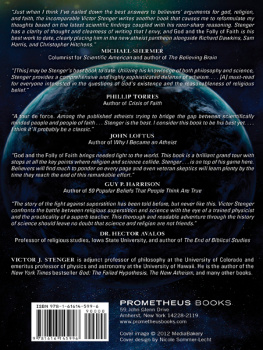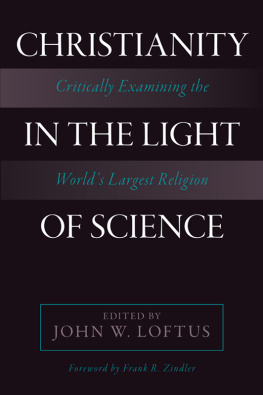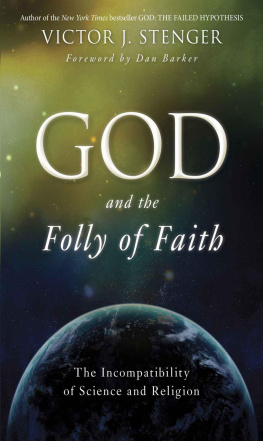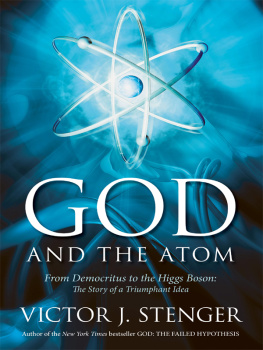VICTOR J. STENGER

An Individual atom of the chemical element Chromium as photographed by a Scanning Tunneling Microscope. The area shown is 3 nanometers (3 billionths of a meter) square. (Photo courtesy of Professor Klaus Sattler, University of Hawaii at Manoa.)
T=O
Like so many of the words we use to describe our deepest notions, "physics" and "psychic" are derived from the language of the ancient Greeks, who first gave rational expression to the concepts these words represent. Physics comes from physic (Ovrns), the Greek word for nature. Psychic is derived from psyche (yyvxri), the term for soul or spirit.
Physics refers to the objects of our senses, the world of body and matter. Phenomena thought to be associated with the nonmaterial world are called "psychic" (sometimes "psychical'), often abbreviated by the Greek letter psi ('P). The conclusion of this book can be summarized by a simple equation: 'P = 0.
The Greeks were the first to apply the power of reason to the study of nature and soul. Their word physiologia translates as the science or logic of nature, although its modem derivative, "physiology," refers in more limited fashion to the study of the physical bodies of living organisms.
Similarly, the modern term "psychology" has become narrowed to the science or logic of mental phenomena, rather than the wider class of anything beyond the physical. Conventional psychology confines itself to the study of mind and human behavior independent of any assumption of a spiritual or supernatural component, although the prefix psych, with its ancient connection to soul or spirit, suggests otherwise. This unfortunate confusion results from the ancient belief in the equivalence of mind and soul. Since time immemorial, human behavior has been assumed to arise from mental and spiritual processes that transcend the world of matter and energy with which the physicist deals. But another possibility exists: Mental phenomena could be physical, wholly a property of the material world.
Mental processes are said to contain "inner" components of a different type than the "outer" components of the sensory world, and this view has led to a division of the studies of matter and mind. Nevertheless, matter and mind have come together in neurophysiology and the other neurosciences. In recent years these disciplines have begun to assume much of the burden previously borne exclusively by psychology, as the physical nature of mind has slowly but inexorably established itself.
Even more fundamental, classifying phenomena as physical and psychical parallels a distinction between two forms of reality that most people also take as self-evident, the division of the world into matter and spirit. The common belief is that two universes exist: (1) matter observed with our eyes and other senses, or scientific instruments, that seemingly obeys natural laws; and (2) another, invisible universe, undetectable by normal means, that is not bound by the laws of the material world-the transcendent universe of the spirit.
If physics is the study of matter, then we might term the study of a world beyond matter "paraphysics." The ancient term "metaphysics" could also be used, but it has other common meanings that suggest more than a mere extension of the methods of physics to phenomena beyond the realm of matter. Metaphysics can refer to any form of abstruse philosophy.
Paraphysics is a nice term, but I have never heard of anyone doing what I would regard as paraphysics: searching for the transcendent far out in space or deep inside atoms using the high-tech tools of the physics laboratory or astronomical observatory. Rather, most attempts to seek evidence for a world beyond matter center instead on human mental phenomena, as observed in the narrow range of everyday experience here on earth.
And so the term "parapsychology" has come to be used for those investigations that seek evidence for a nonphysical component of reality. Parapsychology, not conventional psychology, is normally associated with psi. In its purest interpretation, parapsychology might be termed "the science of the soul." Unfortunately, as we will see, parapsychology has not earned a reputation deserving of such a noble-sounding title.
Parapsychology has a built-in anthropocentric prejudice: that the particular kind of carbon-based life existing on our tiny speck of a planet has a special quality distinguishing it from ordinary matter. The assumption is made that human consciousness, or some extension of consciousness to other forms of life from cockroaches to plants, somehow interacts with the transcendent world of the spirit. I will call this assumption "the psi hypothesis."
That routes to a transcendent world may exist other than through consciousness seems not to have occurred to any parapsychologists whom I have read. But I can imagine such a world having nothing to do with living organisms. Perhaps that world connects instead to some yet undis covered particles not residing within earthly biological materials, but existing in the centers of galaxies. Or perhaps transcendent connections will be found in some new force, still to be uncovered as future particle accelerators probe to higher energies and smaller distances. Of course, that's pure speculation, and hardly likely. My point is simply that the transcendent, if it exists at all, could have nothing to do with mental phenomena.
The psi hypothesis arises from the ancient belief that mind has powers that go beyond matter, that it is capable of performing miracles, that it interacts with other worlds through some special channel or sixth sense. Seeking scientific evidence for such powers is the goal of parapsychology. However, for parapsychology to be credible as the science of psi phenomena, it cannot take the existence of these phenomena as an established fact. Logic and honesty require parapsychologists to admit that convincing scientific evidence for the transcendent has not yet been found. Many, but not all, have admitted this.
Is there any basis for the belief in a world beyond the senses? Is there evidence for spirit or soul? Does the human mind possess supernatural or paranormal powers? Do mental processes-thinking, reasoning, dreaming-have aspects that cannot be understood in terms of our conventional scientific description of the material world? In other words, is there a nonmaterial world?

